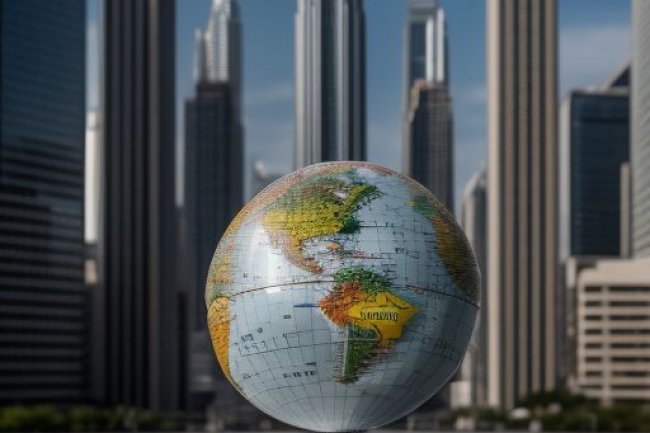ECONOMIC EQUALITY: INCLUSIVE MULTILATERAL ARCHITECTURES
Within the complex web of global interactions, resource exploitation emerges as a pervasive concern, casting a prolonged darkness that fuels a cycle of inequity reverberating through nations and epochs. The call for economic equality rings hollow if it does not encompass responsible resource management – a fundamental pillar on which a just and equitable global order can be built.

Responsible Resource Management
This imperative stems from a realization that true economic parity cannot be achieved until every nation exercises sovereign control over its resources, shielded from the specter of exploitation that has marred history.
Resource exploitation has often unfolded as a tale of the powerful exploiting the vulnerable, a narrative woven into the annals of colonialism and economic imperialism. The asymmetry of power in the global arena has frequently translated into an unbalanced distribution of resources. The consequences are not merely economic; they resonate across ecological, social, and geopolitical dimensions, creating fractures in the very fabric of human civilization.
The paradigm must shift from plunder to stewardship to forge a path toward economic equality. This transformation calls for promoting sustainable resource management practices that prioritize the preservation of ecosystems, biodiversity, and the planet's overall health. It demands that nations, regardless of their economic stature, adopt responsible extraction methods that minimize environmental degradation and prioritize regeneration. This shift toward sustainability is not just an ethical imperative, but also a strategic necessity, for the health of economies is intimately intertwined with the health of the environment.
Responsible resource management goes beyond ecological contemplations. It encompasses establishing equitable partnerships that guarantee the impartial and equitable distribution of benefits derived from these resources. Historically, resource-rich nations have often been left grappling with the paradox of plenty – abundant resources coupled with disproportionate poverty. This paradox underscores the urgent need for international agreements that guarantee that the wealth generated from resource extraction is shared with local communities, empowering them and contributing to their economic advancement.
A poignant example of responsible resource management can be found in Norway's approach to its oil reserves. While endowed with vast oil wealth, Norway recognized the potential pitfalls of reckless exploitation. Instead of squandering this resource, Norway established a sovereign wealth fund that invests a significant portion of oil revenues for future generations. This forward-thinking strategy embodies the essence of economic equality, as it safeguards the interests of both the present and the future, ensuring that the benefits of resources are not ephemeral but enduring.
Furthermore, the concept of responsible resource management extends to a global perspective. The interdependence of nations in an increasingly interconnected world necessitates collaborative efforts to conserve resources for the collective good. Climate change, driven in part by resource-intensive activities, is a glaring reminder of the urgent need for responsible resource management on a global scale. The Paris Agreement, a landmark accord adopted by nearly all nations, exemplifies a collective commitment to mitigating the impact of resource-intensive practices. It stands as evidence of the understanding that the conscientious utilization of resources surpasses boundaries and ideologies, uniting nations in a collective endeavor to preserve the planet for present and forthcoming generations.
The pursuit of economic equality is intrinsically linked to responsible resource management. It requires a profound shift in mindset – from exploitation to stewardship, from short-term gains to long-term sustainability. It demands that nations assume the mantle of guardians of their resources, adopting practices that ensure ecological integrity, social equity, and international cooperation. Responsible resource management is not merely a technical matter; it is a moral imperative that reflects a commitment to forging a just and equitable world. Amid the challenges encountered by the global community in the 21st century, the conscientious management of resources emerges as a critical stride towards attaining economic parity, nurturing worldwide stability, and safeguarding the vibrancy of our planet for the generations that follow.
Inclusivity of Reserve Currencies
When it comes to global finance, the notion of reserve currencies has long held sway over international economic dynamics. However, as the world becomes increasingly interconnected, the existing framework for determining reserve currency status reveals a chink in its armor, one that perpetuates economic disparities among nations. A radical shift toward economic equality beckons, underpinned by a novel approach: the inclusivity of reserve currencies.
Historically, a few dominant currencies have held sway as reserve currencies, wielding significant sway over the global financial framework. The United States Dollar, Euro, Japanese Yen, and the British Pound have been pillars of international trade and finance, profoundly shaping economic transactions. Yet, this concentration of reserve currencies inadvertently propels a cycle of inequality, where nations whose currencies are overlooked or undervalued find themselves marginalized within the economic arena.
A transformative step toward rectifying this imbalance is the recalibration of reserve currency criteria. By adopting a benchmark linked to GDP size – a pragmatic measure like 1 trillion or 2 trillion USD – the landscape of reserve currencies undergoes a paradigm shift. This strategic pivot doesn't just usher in financial diversity; it fosters a level playing field by allowing a broader spectrum of currencies to contribute to global economic stability. Such an approach serves as an antidote to the vulnerabilities inherent in a system dominated by a few currencies, curtailing the ripple effects of economic turbulence that disproportionately impact nations tethered to these dominant currencies.
The inclusivity of reserve currencies is more than a conceptual overhaul; it's a tangible catalyst for economic growth. This revised criterion extends an invitation to nations to accelerate their economic trajectories, vying for a coveted spot among the reserve currencies. Emerging and developed nations are nudged toward fostering growth and innovation, knowing that their efforts could lead to international recognition and economic elevation. This dynamic spurs a positive feedback loop wherein nations are incentivized to enhance their economic prowess, thus contributing to a more balanced global economic architecture.
A glance at history reveals the profound impact of currency inclusivity. A pertinent example is China's drive to internationalize the yuan (renminbi). China's strategic efforts to position the yuan as a global reserve currency have advanced its own economic interests and instigated a broader conversation about redefining the balance of economic power. The acknowledgment of the yuan in the International Monetary Fund's Special Drawing Rights basket represents a significant stride toward inclusivity, validating the potency of revisiting reserve currency norms.
Moreover, the inclusivity of reserve currencies magnifies the democratization of financial systems. Smaller nations, often overlooked within the traditional reserve currency framework, are now presented with a platform to demonstrate their economic mettle. This empowerment echoes through local economies, fueling innovation, employment, and sustainable development. It signals a shift from a top-heavy financial paradigm to a decentralized one, where multiple currencies collaboratively contribute to global financial resilience.
The inclusivity of reserve currencies epitomizes a transformative leap toward economic equality. It challenges the status quo, offering a remedy to the concentration of power and influence within the hands of a few dominant currencies. This recalibration isn't merely a theoretical endeavor; it's a blueprint for fostering a more balanced and equitable global economic order. As nations stand at the crossroads of economic evolution, the embrace of currency inclusivity beckons, heralding a future where diversity, growth, and prosperity are intertwined in a tapestry of mutual benefit.
Sustainable Growth and Development
At the heart of the global stage, a profound challenge echoes across nations and reverberates through time: the issue of resource exploitation. This challenge, deeply embedded within the fabric of international interactions, has given rise to a cycle of inequality that casts a prolonged shadow, perpetuating disparities and echoing through the corridors of history.
Resource exploitation, driven by economic interests and power dynamics, has historically led to the depletion of resources from less powerful nations to benefit more powerful ones. This phenomenon spans various domains, from extracting natural resources to trade imbalances and appropriating cultural heritage. The consequences of this exploitation are far-reaching, leaving marginalized nations at a disadvantage, both economically and socially.
The consequences of resource exploitation are not confined to economic disparities alone; they also extend to social and environmental dimensions. Exploitative practices often exacerbate existing social inequalities, contributing to the marginalization of vulnerable communities within a nation. Additionally, the reckless extraction of resources can lead to irreversible environmental damage, impacting ecosystems and contributing to climate change. As a result, the pursuit of economic equality demands an urgent reevaluation of resource management practices.
In this pursuit, the concept of responsible resource management emerges as a guiding principle. Responsible resource management encompasses a range of strategies and practices to ensure the sustainable use of resources while considering the long-term interests of both nations and the global community. It involves a shift away from short-sighted exploitation towards a holistic approach that integrates economic, social, and environmental considerations.
The sustainable development goals function as a roadmap for conscientious resource management. These objectives, formulated by the United Nations, underscore the necessity of harmonizing economic advancement with social inclusivity and environmental preservation. Through the embrace of sustainable practices, nations can secure their resources for future generations while concurrently fostering economic expansion and diminishing inequality.
Consider the example of mineral extraction. Instead of allowing multinational corporations to exploit resources without oversight, responsible resource management involves implementing regulations that ensure fair compensation, minimal environmental impact, and the equitable distribution of benefits within the nation. This approach protects the interests of the local population and contributes to a more just global economic landscape.
Furthermore, responsible resource management necessitates collaboration on a global scale. International agreements and frameworks play a crucial role in regulating the exploitation of resources that transcend national boundaries. For instance, agreements related to the management of marine resources in international waters or the protection of biodiversity through conventions like the Convention on Biological Diversity are integral to ensuring responsible resource management on a global level.
Implementing responsible resource management requires a multi-pronged approach. Firstly, nations must enact comprehensive regulatory frameworks that address environmental, social, and economic concerns. These regulations should incentivize sustainable practices, penalize irresponsible behavior, and ensure that benefits are equitably distributed. Secondly, transparent monitoring and reporting mechanisms should be established to hold both nations and corporations accountable for their resource management practices.
Moreover, the transition to responsible resource management involves technological innovation and capacity building. Advancements in sustainable technologies can reduce the environmental impact of resource extraction and processing. Additionally, providing technical assistance and knowledge sharing to nations with limited resources can empower them to adopt responsible practices that align with their economic and developmental goals.
A compelling example of responsible resource management can be found in Norway's approach to oil and gas extraction. As a major oil producer, Norway has implemented stringent regulations to ensure environmental sustainability and fair revenue distribution. The government has established a sovereign wealth fund that invests a portion of oil revenues to benefit future generations. This approach supports economic equality within Norway and showcases how responsible resource management can be a model for others to follow.
The issue of resource exploitation has deep-seated implications for economic equality, environmental sustainability, and social justice. Responsible resource management stands as a beacon of hope in addressing these challenges, forging a path toward a more equitable and harmonious global landscape. By embracing sustainable practices, enacting comprehensive regulations, and fostering international collaboration, nations can pave the way for a future where resources are managed responsibly and the cycle of inequality is broken. The journey towards responsible resource management is not just an obligation; it's a shared commitment to a better world for present and future generations alike.




















